The very first book after the four Gospels is the Book known as “Acts,” sometimes even as “Acts of the Apostles.” It was written by Luke, the same writer as the Gospel according to Luke. So it can be thought of as the continuation of that Gospel story.
In the Book of Acts we see a brief description of Christ resurrected with His followers, and the Ascension of Christ out of space-time, leaving the Holy Spirit to indwell us. Immediately, there begins a large number of dramatic events. Consider the following summary of just a few of them in the Book of Acts:
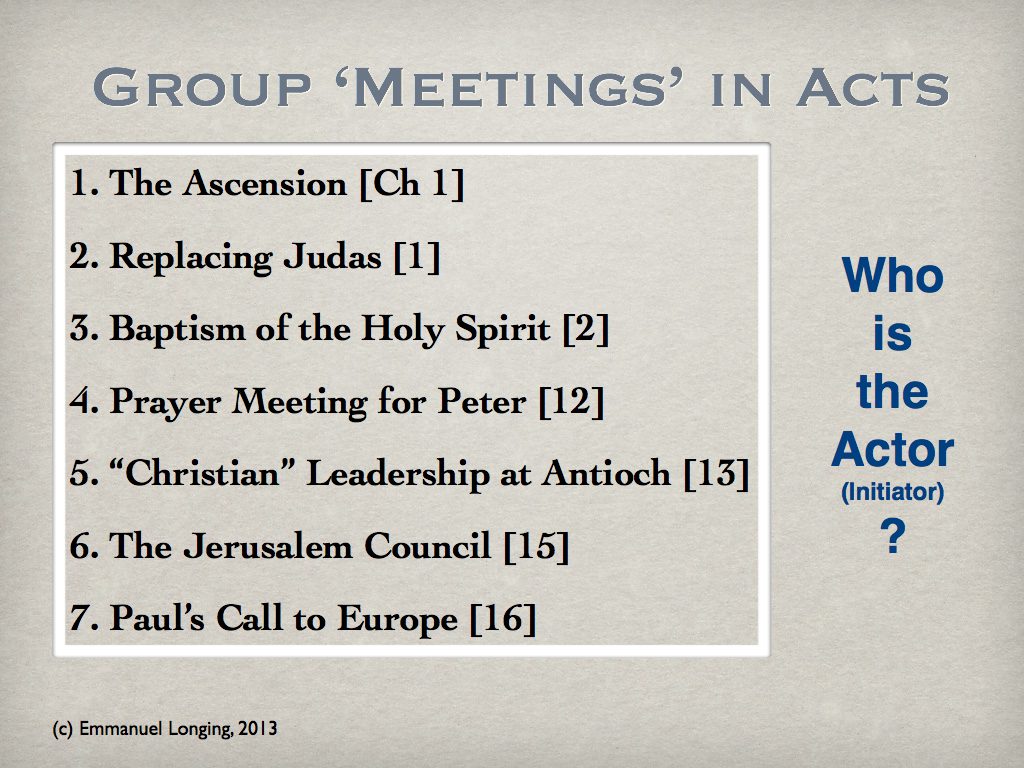 The above chart leads to the question, that in these seven example benchmark ‘Acts’ in the Book of Acts, who is the “Actor” (that is, the one at work making these things happen)? Is it Peter or Paul? Who?
The above chart leads to the question, that in these seven example benchmark ‘Acts’ in the Book of Acts, who is the “Actor” (that is, the one at work making these things happen)? Is it Peter or Paul? Who?
Let us consider two dimensions in answering this question: what human (or humans) were active, and what is the claim that the Holy Spirit of God is at work? First, let’s look at the humans.
The Apostle Peter has achieved a certain notoriety. And of course there is the later apostle Paul (where “apostle” means one sent with a message). We even have world renown church buildings named after St Peter (Rome) and St Paul (London). But in addition to these two individuals, the Book of Acts makes very clear that there were many humans involved in spreading the message of the Gospel, many of which were not the original remaining 11 Apostles (Judas, the 12th original Apostle, of course had by then been shown to be a betrayer and became a suicide). These include: all the other 10 Apostles (besides Peter), all of whom are named and referred to as a group in the plural as being messengers to witness to Christ’s resurrection (Acts 1:8, 13; 5:29); there were women, and Jesus’s own blood brothers (1:14); Joseph Justus and Matthias (1:23); all of the Apostles as a group (2:37); John (Ch 3 & 4); Barnabas (3:36); Stephen, Philip, Prochorus, Nicanor, Timon, Parmenas, Nicolas (6:5); Steven (Ch 7; Ch 11); Philip (Ch 8); Ananias (Ch 9); Cornelius (Ch 10); Agabus (11:28; 21;10); Mary and Rhoda (12:12-13); Simeon, Lucius, Manaen (13:1); John Mark (Ch 13); James, the Lord’s brother (Ch 15); Judas Barsabas, Silas (15:22); Timothy (16:1); Lydia (16:14); Jason (Ch 17); Aquila and Priscilla (Ch 18); Apollos (18:24); Sopater, Aristarchus, Secundus, Gaius, Tychicus, and Trophimus (Ch 20); Mnason (21:16). Note: I have not included all the names of individuals who were ministered to; the above list is of people who were themselves ministers of God; also I have not included the many passages involving Peter and Paul, who are named more so than any other, one as God’s minister to the Jews (Peter) and the other to the Gentiles (Paul), in exactly the opposite assignment you and I would have given them, given Paul’s great expertise in the Old Testament law.
Let us further note that there is no clear hierarchy in this list of names. Clearly Peter and Paul appear more prominently. But the other people named do not “work for” or “report to” either Peter or Paul. No one person is called “the” pastor (nor is any person called “pastor” for that matter), or “bishop,” or “father” (“pope”).
Now let’s look at the other dimension, namely the activity of the Spirit of God in the Book of Acts. Christ at His Ascension reminds His disciples that the Holy Spirit will “baptize” (in my view, “identify / mark”) them (Acts 1:8). Angels appear to the men watching “steadfastly” (i.e., locked on and fixed in looking up) (Acts 1:11). The Holy Spirit spoke to the Apostles in the upper room through the already written Old Testament (1:16). And so it goes, chapter after chapter in the Book of Acts, the Holy Spirit is the actor (initiator). I invite you the reader to make this discovery for yourself simply by scanning each of the remaining 27 chapters in Acts to make that realization for yourself.
So, is the book of Acts about the acts of the Apostles? No. There are many other people involved as we have seen above. Even Paul was, in his own words, a Believer untimely born (meaning that he came to know Christ only after the Ascension); he was not one of the original Apostles. The real ‘actor’ of Acts is the Holy Spirit of God. His Hand is apparent in every chapter, working through many different men. We will come to why it is important to make this distinction of who is the Actor. For now, consider in the chart below how “men” tend to “act” (do stuff), and contrast it with what God through the Spirit accomplished through men in the Book of Acts: 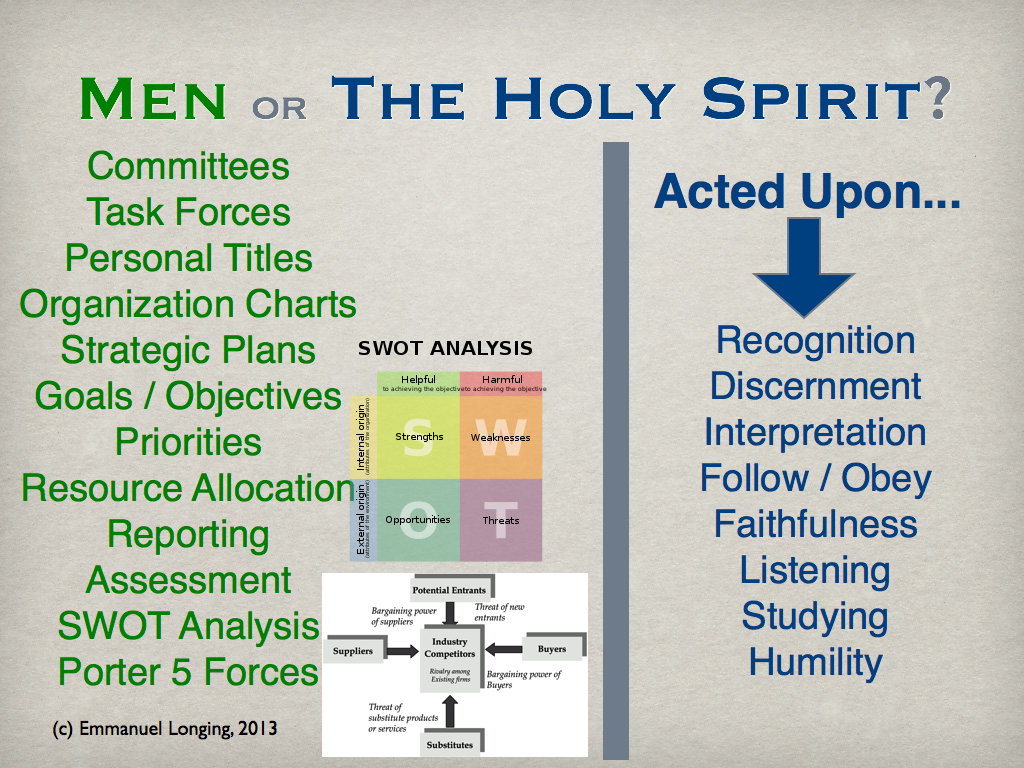 The small graphics on the “man” side of the above chart are famous tools of growth analysis opportunities used in strategic planning in the business world, the SWOT Analysis and the Porter 5 Factor analysis. Nothing like this occurs in Acts. Rather it is men discovering, often with difficulty, what God is already doing.
The small graphics on the “man” side of the above chart are famous tools of growth analysis opportunities used in strategic planning in the business world, the SWOT Analysis and the Porter 5 Factor analysis. Nothing like this occurs in Acts. Rather it is men discovering, often with difficulty, what God is already doing.
Let us now apply this concept the the building of “the church.” Recall that in the Upper Room Discourse, Jesus foretold the Apostles about “the church.” The church meant and means, literally, “the called out ones.” Who does “the calling?” The very structure of the phrase “the called out ones” strongly suggests that we are called by an outside Voice. We saw this in the Gospels when Christ “called out” the Apostles: John 15:16 You did not choose Me, but I chose you and appointed you that you should go and bear fruit, and that your fruit should remain, that whatever you ask the Father in My name He may give you.
So, let us think about four possibilities based upon (1) whose church it is, and (2) who builds it. See the below diagram for these possibilities. Before we turn to the one correct answer–Matthew 16:18 And I also say to you that you are Peter, and on this rock I will build My church, and the gates of Hades shall not prevail against it.–reflect on how easy it is to fall into thinking along the line of the other three combinations. Haven’t we all felt or said we are building “our church” or “Christ’s church?” Don’t we easily think that we give glory to God by saying Christ is “building our church?” But Scripture teaches, and the Book of Acts clearly demonstrates, Christ is building His church, and the ministry of the Holy Spirit of God is the active Agent in doing so.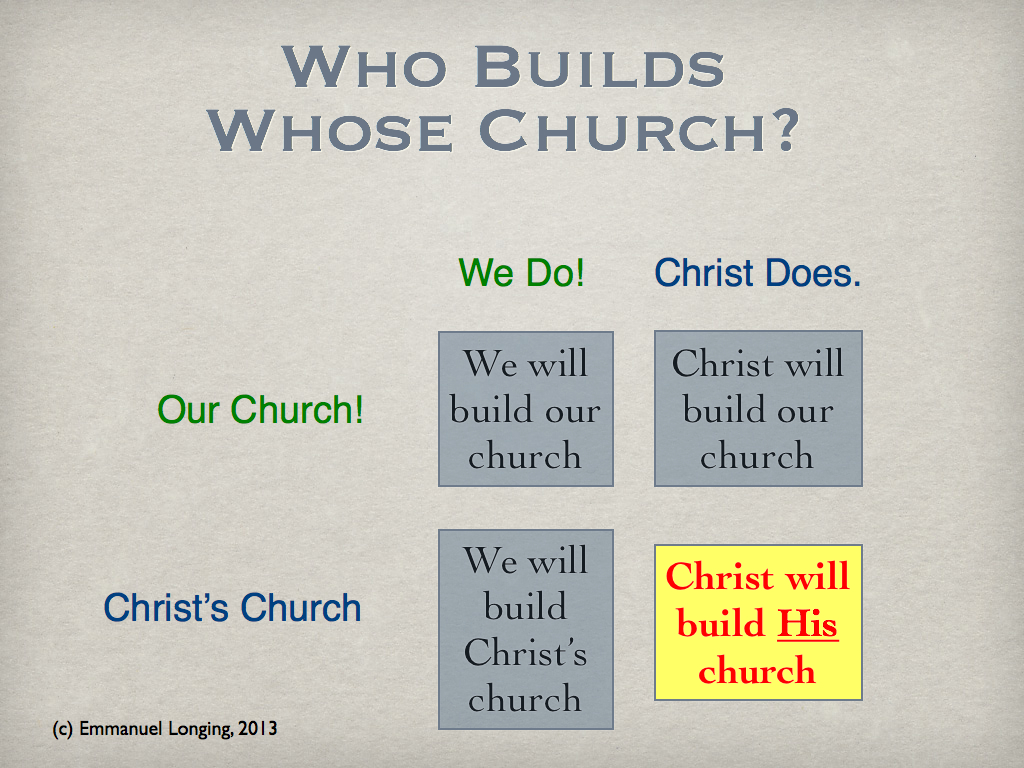 What are some of the alternative views of “what happens now?” (that Christ has Ascended)? See the below summary of four prominent answers to this question:
What are some of the alternative views of “what happens now?” (that Christ has Ascended)? See the below summary of four prominent answers to this question: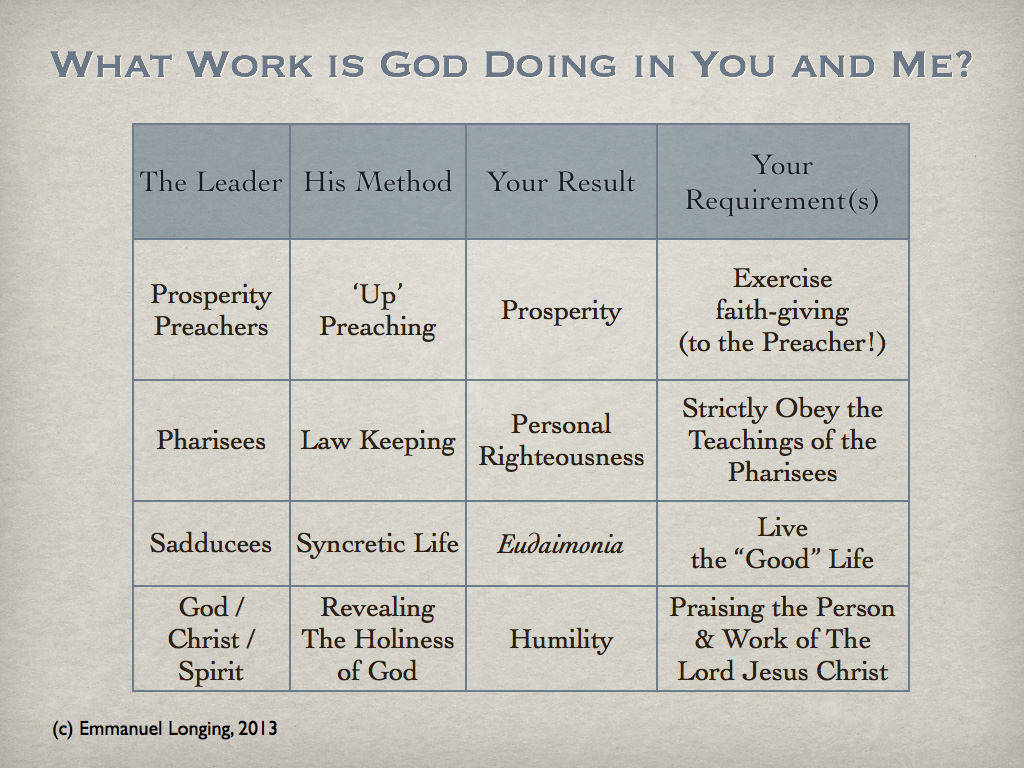 Prosperity Preaching (& Preachers). It is in our nature to seek to prosper. It started with Eve and then Adam, and has continued through every generation and human down to you and me. Where there’s a desire, there’s a supplier: prosperity religion is such a supplier. Some of it is pretty gross and obvious. Some of it is very subtle. But the common message is this: God is there and available to make you a more prosperous person…”if….” What’s the “if?” It takes different forms, but the differences are not really essential. The “if” is the means by which God and His supernatural powers can be put to one’s service, sort of like a very powerful and handy-to-have butler.
Prosperity Preaching (& Preachers). It is in our nature to seek to prosper. It started with Eve and then Adam, and has continued through every generation and human down to you and me. Where there’s a desire, there’s a supplier: prosperity religion is such a supplier. Some of it is pretty gross and obvious. Some of it is very subtle. But the common message is this: God is there and available to make you a more prosperous person…”if….” What’s the “if?” It takes different forms, but the differences are not really essential. The “if” is the means by which God and His supernatural powers can be put to one’s service, sort of like a very powerful and handy-to-have butler.
Law Keeping. God certainly gave the Mosaic Law, and Law itself if a good thing. But God’s purpose in so giving the good Law was to reveal our utter inability to live up to it. In the Epistles to Romans and Galatians, the Bible makes clear that the Law was our ‘tutor’–schoolteacher of sorts–that leads us to the realization that we need a Savior Who by Grace alone provides the righteousness that we could never attain. Law keeping preaching comes in many forms. But it, like prosperity preaching, lives by an “if:” “if” you do X, and / or don’t do Y, “then” you will be righteous like God, or righteous enough, especially compared to your contemporaries, that God will be sufficiently impressed to take you into His Kingdom, because, well, you simply deserve to be there.
“The Good Life.” There has always been another strategy for living that seeks to find and live a “good life.” This is necessarily highly individualistic because, well, it’s all about me, who I am, and what I can be. If it ‘feels good,’ and makes ‘sense’ (to me), well then, it must be good ‘for me,’ because ‘me’ is the ultimate standard, and if there’s a God He would want nothing less than for ‘me’ to be a ‘good me.’
Christ Builds His Church (and everyone in it). The alternative to the above, and every other version of man’s own agenda, is the Person and Work of Jesus Christ. There is a kind of ‘prosperity’ in it, and a framework for righteous living, and a genuine goodness experienced through it, but it is the journey Christ is taking us all on for His glory alone.
Consider this quote from Tim Keller, teaching minister of Redeemer Church in Manhattan NY: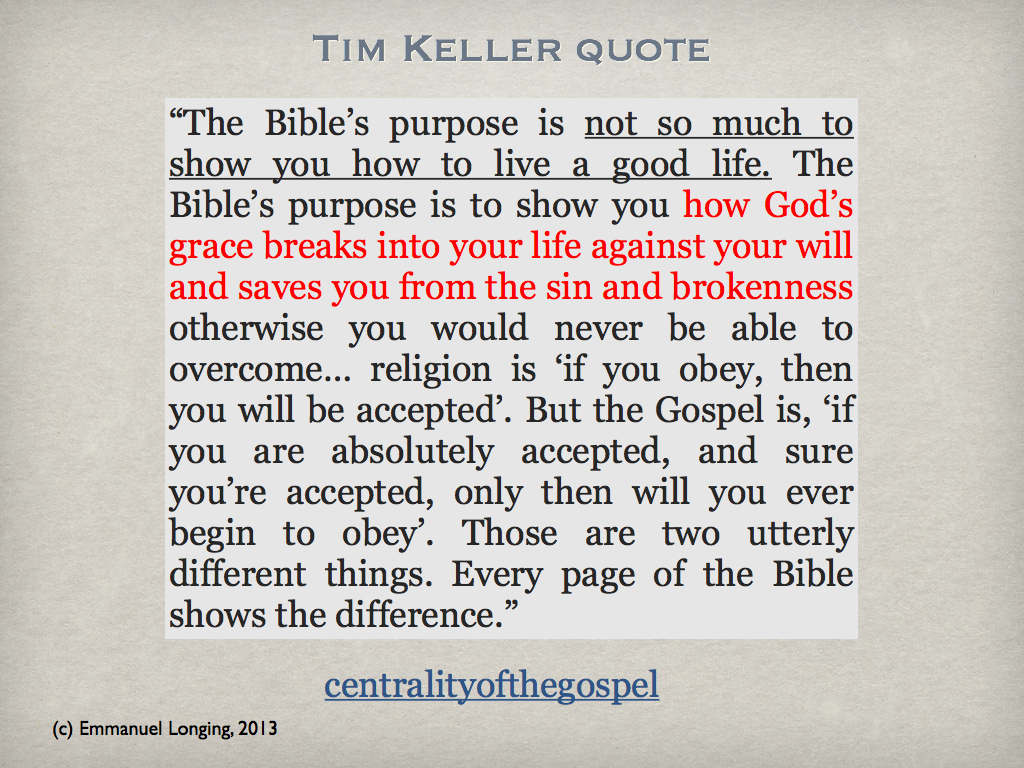 Let us now turn back to our beginning topic of “Hope.”
Let us now turn back to our beginning topic of “Hope.”